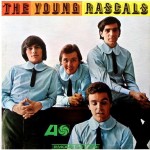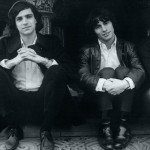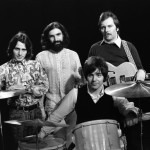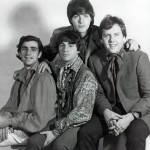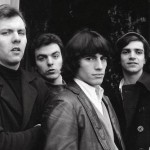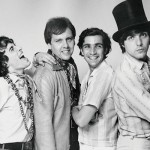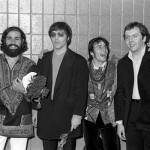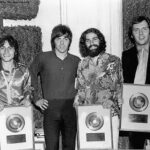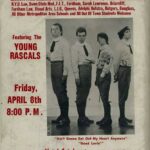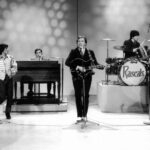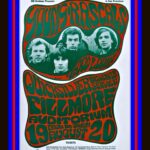The Rascals (initially known as The Young Rascals) are an American blue-eyed soul group[1] initially active during the years 1965–72. Between 1966 and 1968 the New Jersey act reached the top 20 of the Billboard Hot 100 with nine singles, including the #1s “Good Lovin'” (1966), “Groovin'” (1967), and “People Got to Be Free” (1968), as well as big radio hits such as the much-covered “How Can I Be Sure?” (#4 1967) and “A Beautiful Morning” (#3 1968), plus another critical favorite “A Girl Like You” (#10 1967). The band was inducted into the Rock and Roll Hall of Fame in 1997.[2]
The Rascals were inducted into the Hit Parade Hall of Fame in 2010 and also reunited in 2012 for a series of shows in New York and New Jersey. The reunion has continued on in 2013 with shows on Broadway.
Eddie Brigati (vocals), Felix Cavaliere (keyboard, vocals), Gene Cornish (guitar) and Dino Danelli (drums) started the band in Brigati and Danelli’s hometown of Garfield, New Jersey. Brigati, Cavaliere and Cornish had previously been members of Joey Dee and the Starliters.[3] Eddie’s brother, David Brigati, an original Starliter, helped arrange the vocal harmonies and sang backgrounds on many of the group’s recordings (informally earning the designation as the “fifth Rascal”). When Atlantic Records signed them, they discovered that another group, Borrah Minnevitch’s and Johnny Puleo’s ‘Harmonica Rascals’, objected to their release of records under the name ‘The Rascals’. To avoid conflict, manager Sid Bernstein decided to rename the group ‘The Young Rascals’.
The Young Rascals’ first television performance was on the program Hullabaloo on February 27, 1965, where they performed their debut single, “I Ain’t Gonna Eat Out My Heart Anymore”. The track reached #23 in Canada, and touched the lower reaches of the U.S. charts. This modest success was followed by the U.S./Canada #1 single “Good Lovin'” (1966, originally recorded by Lemme B. Good & The Olympics in 1965 with much different lyrics).
Felix Cavaliere was a Syracuse University student in 1963 and playing with a popular campus group, Felix & The Escorts, when he was asked by Joey Dee & The Starliters (of Peppermint Twist fame) to join them on a tour of Europe. There, the young keyboardist met Eddie Brigati and Gene Cornish. “We didn’t want to be somebody else’s sidemen,” recalled Cornish, so after a few months they left The Starliters and, with a drummer friend, Dino Danelli, began rehearsing together. According to Gene, “All of a sudden we hit magic in Felix’s basement. We’d all been in bands before and we just looked at each other and went, ‘woah!’ It was just amazing; I can’t explain it. That day literally changed my whole life. I think we blasted through 30 or 40 songs at that rehearsal. We knew we belonged together.”As 1964 turned to 1965, the British Invasion was in full swing, and along with the soul/R&B sounds popular on the New York club scene frequented by the group, now dubbed The Young Rascals, The Beatles were a major influence. “We always admired The Beatles because they proved that you could write great songs as well as play and sing them,” said Cornish. The Beatle connection didn’t stop there, however. Sid Bernstein, the promoter who brought the Fabs to Shea Stadium, added The Young Rascals to the bill at that famous concert — after having signed on a few months earlier as the group’s manager.
In some accounts, Bernstein takes the blame for the schoolboy stage suits the group performed in at first, but Cornish remembers differently: “We had the outfits even before we had the name. Eddie came to the first rehearsal wearing it as a goof, joking around, and we said, ‘What a great idea!’ Before we had a hit record, before people remembered the name, they remembered the kids with knickers.” The hit records and name recognition were soon to come, though, after Atlantic founder Ahmet Ertegun saw the band at a Westhampton nightclub and offered them a contract.
Atlantic was the perfect label for this mixture of black and white rock, given its legendary roster of soul performers and producers. “The Atlantic philosophy was a jazz philosophy of capturing an energy and a moment,” says Cavaliere. “The feelings in those early recording sessions will be there forever.” Atlantic producer/engineer Tom Dowd recalled: “The Rascals were unusual. They were a macho band. Three of them could sing like birds, but they played aggressively, even on ballads. There was an energy to them, a positive energy. They put on a great show and they were fun. They were dedicated to their concept.
The Young Rascal’s Hit Records
- I Ain’t Gonna Eat Out My Heart Anymore (#52 – 1965)
- Good Lovin'( #1 – 1966)
- You Better Run (#20 – 1966)
- I’ve Been Lonely Too Long (#16 – 1966)
- Groovin'(#1 – 1967)
- A Girl Like You (#10 – 1967)
- How Can I Be Sure (#4 – 1967)
- It’s Wonderful (#20 – 1967)
- A Beautiful Morning (#3 – 1968)
- People Got To Be Free (#1 – 1968)
- A Ray Of Hope (#24 – 1968)
- Heaven (#39 – 1969)
- See (#27 – 1969)
- Carry Me Back (#26 – 1969)
